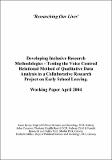| dc.contributor.author | Millar, Michelle | en |
| dc.contributor.author | Canavan, John | en |
| dc.contributor.author | Byrne, Anne | en |
| dc.date.accessioned | 2009-07-03T09:19:26Z | en |
| dc.date.available | 2009-07-03T09:19:26Z | en |
| dc.date.issued | 2004 | en |
| dc.identifier.citation | Byrne, A., Canavan, J., & Millar, M. (2004). Developing inclusive research methodologies: testing the voice centred relational method of qualitative data analysis in a collaborative research project on early school leaving. Political Science and Sociology, NUI, Galway; Child & Family Research and Policy Unit, WHB/ NUI Galway. | en |
| dc.identifier.uri | http://hdl.handle.net/10379/234 | en |
| dc.description.abstract | Committed to developing collaborative research processes and practices, this study sought to establish research partnerships between academic researchers, activists working in a context of social exclusion and those experiencing social exclusion. Responding to ideological and methodological challenges to democratise research processes and practices, the paper discusses the process of establishing collaborative research partnerships while assessing a methodological adaptation of the Voice Centred Relational (VCR) method of data analysis. The VCR method was used to interpret data on different experiences of school with a particular focus on early school leaving among a group of teenagers in a rural area in the West of Ireland.
The VCR method claims to clarify conventions for the interpretation of qualitative data. Arguably, this removes some of the technical barriers that inhibit the possibility for the researched to become active interpreters of the data that they present to researchers. In order to test this and other claims of the VCR method, a collaborative research study was designed which included research participants in the analytical and interpretive practice of data analysis. This paper reports on the process of establishing a collaborative interpretive community and on the practice of adapting social science analytical methods so that deeper inclusion in the practice of research is realised for researchers and researched alike. | en |
| dc.format | application/pdf | en |
| dc.language.iso | en | en |
| dc.publisher | Child & Family Research and Policy Unit, WHB/ NUI Galway. | en |
| dc.rights | Attribution-NonCommercial-NoDerivs 3.0 Ireland | |
| dc.rights.uri | https://creativecommons.org/licenses/by-nc-nd/3.0/ie/ | |
| dc.subject | Democratisting research process and practice | en |
| dc.subject | Collaborative partnerships | en |
| dc.subject | Qualitative data anlysis | en |
| dc.subject | Voiced centred relational method | en |
| dc.subject | Early school leaving | en |
| dc.subject | Social exclusion | en |
| dc.subject.lcsh | Marginality, Social | en |
| dc.subject.lcsh | Dropouts | en |
| dc.subject.lcsh | Social sciences -- Research | en |
| dc.subject.lcsh | Social sciences -- Methodology | en |
| dc.title | Developing inclusive research methodologies: testing the voice centred relational method of qualitative data analysis in a collaborative research project on early school leaving | en |
| dc.type | Report | en |
| nui.item.downloads | 1341 | |


